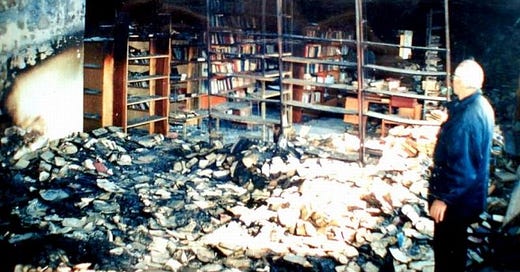The War in Abkhazia was fought between Georgian government forces and Abkhaz separatist forces, Russian government armed forces and North Caucasian militants between 1992 and 1993. 1
During the 1992-93 war both sides attacked the cultural artefacts of the other.
The most striking act of cultural vandalism was the destruction of the Abkhazia National Library and Archive in Aqwa (Sukhumi.)2
Georgian troops entered Abkhazia on 14th August 1992, sparking a 14-month war. At the end of October, the Abkhazian Research Institute of History, Language and Literature named after Dmitry Gulia,3 which housed an important library and archive, was torched; also targeted was the capital's public library.4
An Unrepresented Nations and Peoples Organization (UNPO)5 report outlines the history of the conflict:
Testimony concerning the burning of the National Archives building was confirmed by a Georgian witness employed in a Procuratorial office in Sukhumi at the time. 6
Shesterinina, Anastasia. 2021. Mobilizing in Uncertainty : Collective Identities and War in Abkhazia. Cornell University Press.
Thomas de Waal (2008). Abkhazia: Cultural Tragedy Revisited.Abkhaz World. Also as Abkhazia: Cultural Tragedy Revisited (2002) in Institute for War and Peace Reporting.
Arsène Saparov. 2015. From Conflict to Autonomy in the Caucasus : The Soviet Union and the Making of Abkhazia, South Ossetia and Nagorno Karabakh. Central Asian Studies. New York: Routledge.
Ibid. Thomas de Waal (2008).
Unrepresented Nations and Peoples Organization (UNPO) is an international movement and organization established to empower the voices of unrepresented and marginalized peoples worldwide and to protect their rights to self-determination.
UNPO Abkhazia Report, November 1992, Human Rights and Cultural Destruction.






What terribe, wanton destruction!